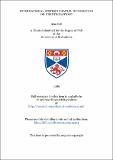International systems change: integration or disintegration?
Abstract
International systems change; integration or disintegration? Homo sapiens seek stabilisation and tend toward a state of equilibrium in life and in times of rapid change, attempt even more to achieve a relative condition approaching a normative status quo. International systems tend also to focus on stabilising behaviour in a like manner as a quantitative enlargement of the Individual phenomenon. Within the European context, expansion (integration) as an attempt to maintain stability may not be achieving the hoped for success because of the do ut des phenomenon. Single collectivities attempt a best possible relationship based on particularistic motives. Theories have yet to focus on the social dimension of integration and tend to selectively single out the more readily available economic and political aspects. Effective, expanded society is the product of mutual feelings, often unarticulated with higher degrees of consonance more prone to integrate, given the extensive range of compatibilities than non-European society's exhibiting dissonance. Individuals, fundamentally motivated by needs, respond to needs in similar fashions, developing linkages. But how can authority shift if the authoritarian state is unwilling to relinquish same? The opposite of authoritarian prejudicial subjectiveness is objective humanistic liberalism, a product highly correlated with education and exposure. Collectivities grow organically from within, through cognition, and during rapid change, International accommodation may develop most effectively only on this basis. An adequate assessment and projection of European Integration may be possible only by determining the causation and degree of the individual commitment.
Type
Thesis, PhD Doctor of Philosophy
Collections
Items in the St Andrews Research Repository are protected by copyright, with all rights reserved, unless otherwise indicated.

